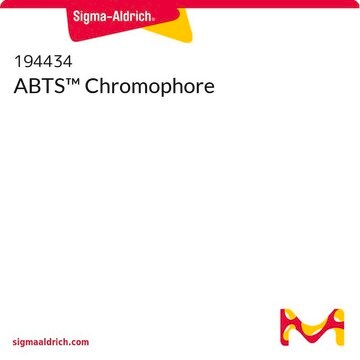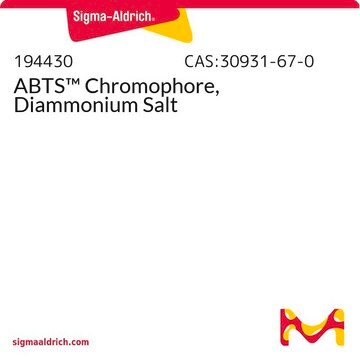A1227
ABTS Enhancer
liquid, for peroxidase detection
Synonym(s):
2,2′-Azino-bis(3-ethylbenzothiazoline-6-sulfonic acid) Enhancer
Sign Into View Organizational & Contract Pricing
All Photos(1)
About This Item
UNSPSC Code:
12352204
NACRES:
NA.83
Recommended Products
Application
2,2′-azino-bis(3-ethylbenzothiazoline-6-sulphonic acid) (ABTS) has been used for the determination of laccase activity in Trametes versicolor. It may be suitable for use in enzyme-linked immunosorbent assay (ELISA) for detecting signal strength emitted by cells.
Biochem/physiol Actions
2,2′-azino-bis(3-ethylbenzothiazoline-6-sulphonic acid) (ABTS) is a non-phenolic substrate. It might exhibit antioxidant property. The detection of the horseradish peroxidase substrate ABTS can be improved by the addition of a chemical enhancer. The ABTS enhancer increases the absorbance of the oxidized product 50-150%. This increase is used to improve assay sensitivity or conserve assay components.
Physical form
Supplied as an 11X concentrate
Signal Word
Danger
Hazard Statements
Precautionary Statements
Hazard Classifications
Aquatic Chronic 3 - Carc. 1B
Storage Class Code
6.1C - Combustible acute toxic Cat.3 / toxic compounds or compounds which causing chronic effects
WGK
WGK 3
Flash Point(F)
Not applicable
Flash Point(C)
Not applicable
Certificates of Analysis (COA)
Search for Certificates of Analysis (COA) by entering the products Lot/Batch Number. Lot and Batch Numbers can be found on a product’s label following the words ‘Lot’ or ‘Batch’.
Already Own This Product?
Find documentation for the products that you have recently purchased in the Document Library.
Customers Also Viewed
Mark E Levenstein et al.
Stem cells (Dayton, Ohio), 26(12), 3099-3107 (2008-09-20)
Human embryonic stem (ES) cells can be maintained in an undifferentiated state if the culture medium is first conditioned on a layer of mouse embryonic fibroblast (MEF) feeder cells. Here we show that human ES cell proliferation is coordinated by
Investigations on antioxidant potential of phenolic acids and flavonoids: the common phytochemical ingredients in plants
Singh DP, et al.
Journal of Plant Biochemistry & Physiology (2018)
Khaled K Abu-Amero et al.
Molecular vision, 17, 2769-2775 (2011-11-09)
To evaluate total antioxidant status (TAS) in the plasma of pseudoexfoliation glaucoma (PEG) patients and to compare this level with a matching control group. Additionally, we aim to investigate the effect of the combined action of the lysyl oxidase-like 1
Manickam Naresh Kumar et al.
Bioresource technology, 244(Pt 1), 353-361 (2017-08-07)
Inhibitor mediated intensified bio-pretreatment (IMBP) technology using natural cellulase inhibitor (NCI) for maximum cellulose recovery from paddy straw was studied. Pretreatment was carried out under solid state condition. Supplementation of 8% NCI in pretreatment medium improves cellulose recovery and delignification
Meng-Hsuan Wu et al.
Scientific reports, 9(1), 9754-9754 (2019-07-07)
Laccases that are tolerant to organic solvents are powerful bio-catalysts with broad applications in biotechnology. Most of these uses must be accomplished at high concentration of organic solvents, during which proteins undergo unfolding, thereby losing enzyme activity. Here we show
Our team of scientists has experience in all areas of research including Life Science, Material Science, Chemical Synthesis, Chromatography, Analytical and many others.
Contact Technical Service










